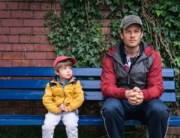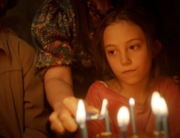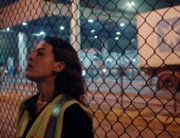Stalin is alleged to have called a single death a tragedy and a million deaths a statistic. Art can whittle the great events of our lives down to a more manageable size. One of the strengths of After is its skill in depicting the way a national disaster ripples through a single family.
The family in question is the Valentinos, native to upstate New York. They are flawed but decent people, remnants of the dwindling American middle-class/working-class folks we’re expected to unquestioningly root for. The archetypes abound: there’s the responsible son taking over the family business, set off by the prodigal younger one, and the boozy aunt complemented by the straight-shooting daughter. Unfortunately, none of them has enough charisma to elicit sympathy. What keeps the film compelling is a mystery, as screenwriter Sabrina Gennarino hints at the Valentinos’ troubles while keeping us guessing, for an hour and a half, about the root problem.
Her dialogue can be stiff, though. Characters sometimes too baldly state their intentions, or deliver lines which are clearly expository. Still, this is eased by solid performances from the cast, which includes Academy Award nominee Kathleen Quinlan (Apollo 13) and John Doman (The Wire) as parents maintaining a delicate balance. What’s most lacking from this slice of Rochester, New York, set in 2002, is a sense of humor. The Valentinos specialize in stonework, and this has seeped into their conversations.
For instance, at one point near the climax, the troubled son, Nicky (Adam Scarimbolo, doing his best Mark Wahlberg), enters the family place of business all black and blue. “What happened to you?” he is asked. “Penance,” he replies. “That seems to be going around,” says his dad, grimly. And that’s the funniest moment.
The rest is standard drama. Everyone takes turns having a “what do you want me to do?” moment. Then, as the story seems dangerously close to turning into an interminable episode of The Family That Couldn’t Catch a Break, the patriarch receives an infusion of can-do spirit and begins to roll back the tide. All that’s left is the final moment of tragic recognition, and Quinlan facilitates this.
Putting aside the questions of whether After rashly augments its emotional stakes by incorporating a real-life catastrophe, its relationship to history is still singularly fraught. There is something disappointing and simplistic in attaching the closing statement “We will never forget” to a film that has painstakingly depicted the trauma inherent in remembering. After is about the necessity not to remember but to process. This family does not forget, yet all except one are capable of putting the past into perspective and getting on with life.







Leave A Comment